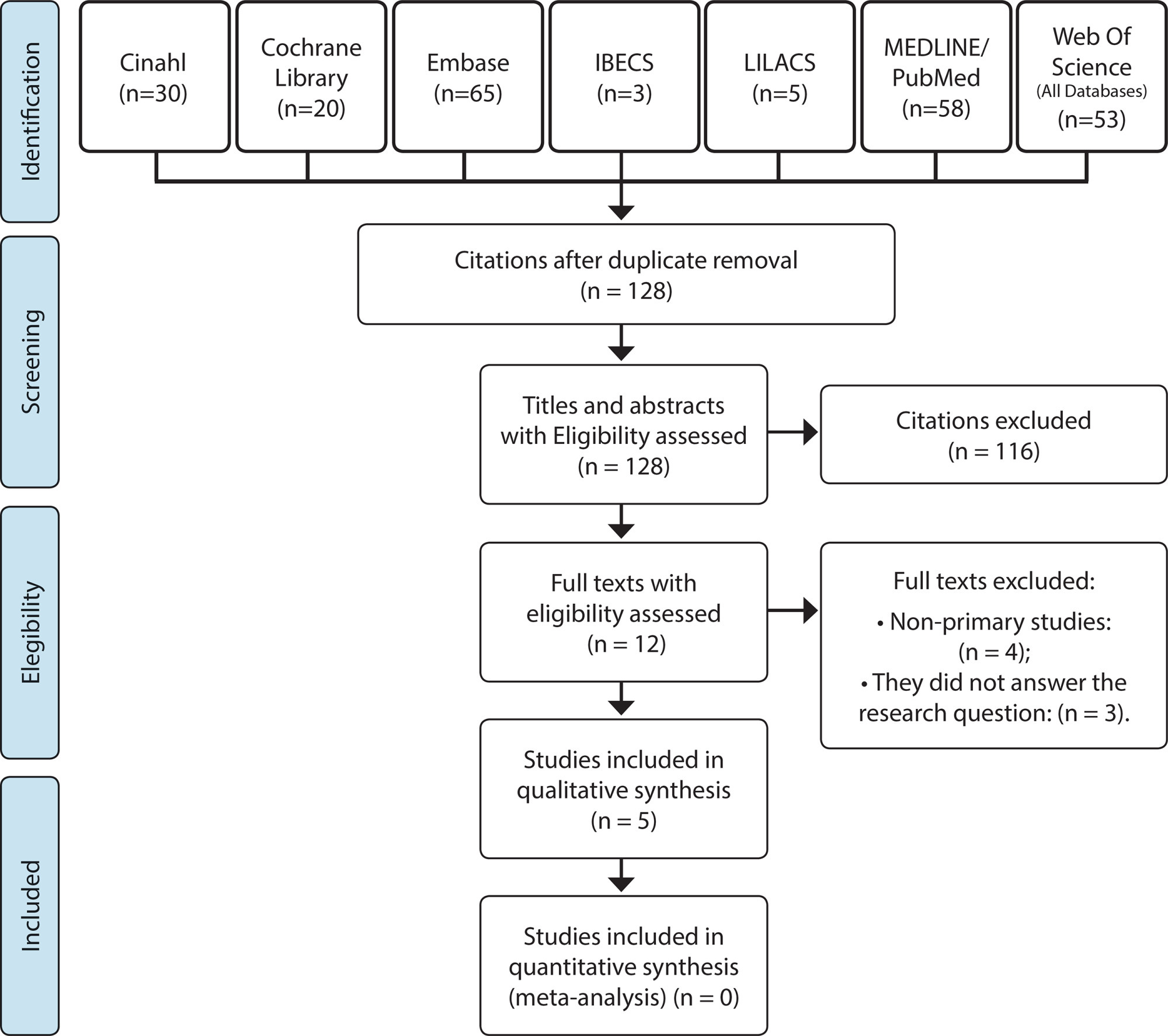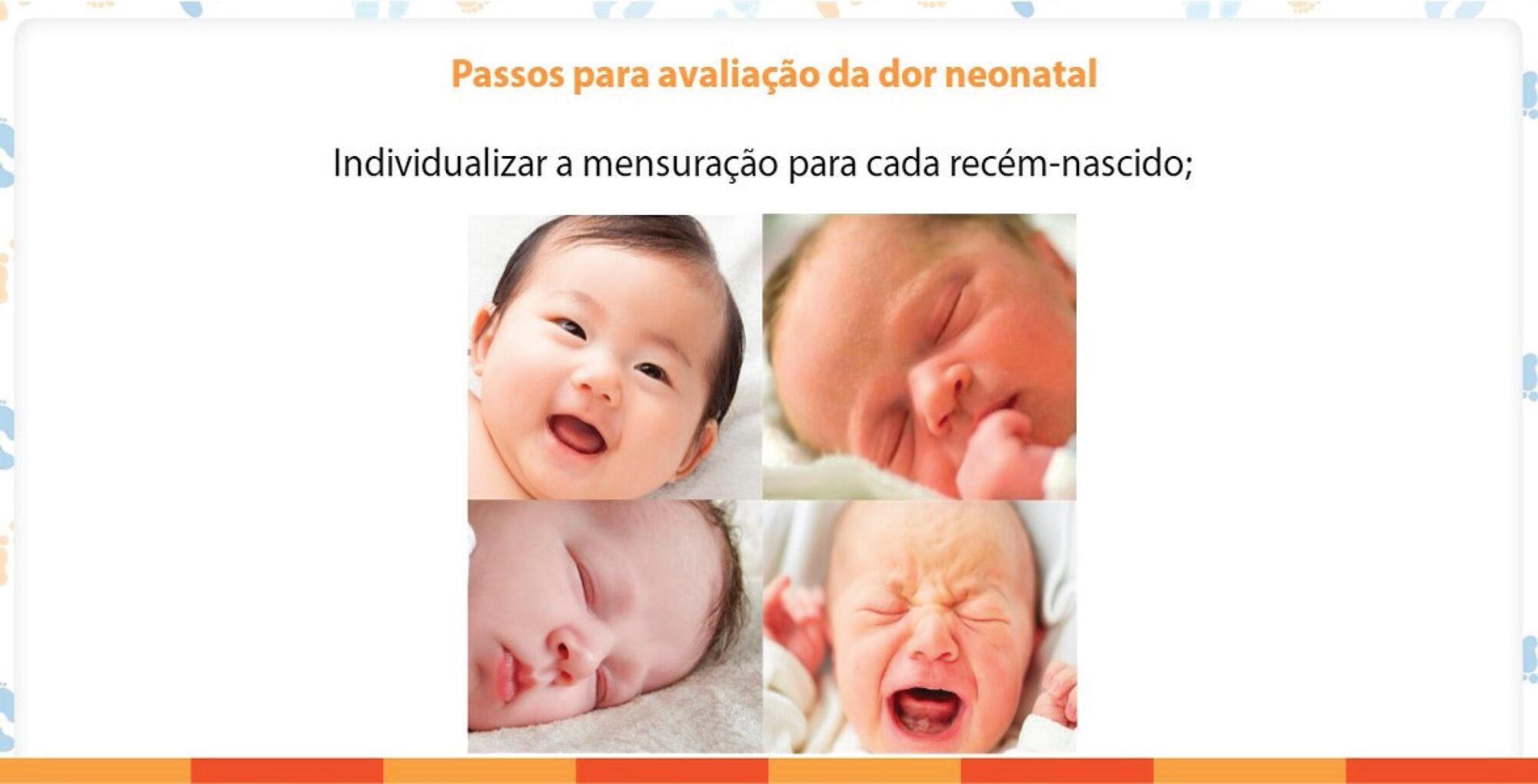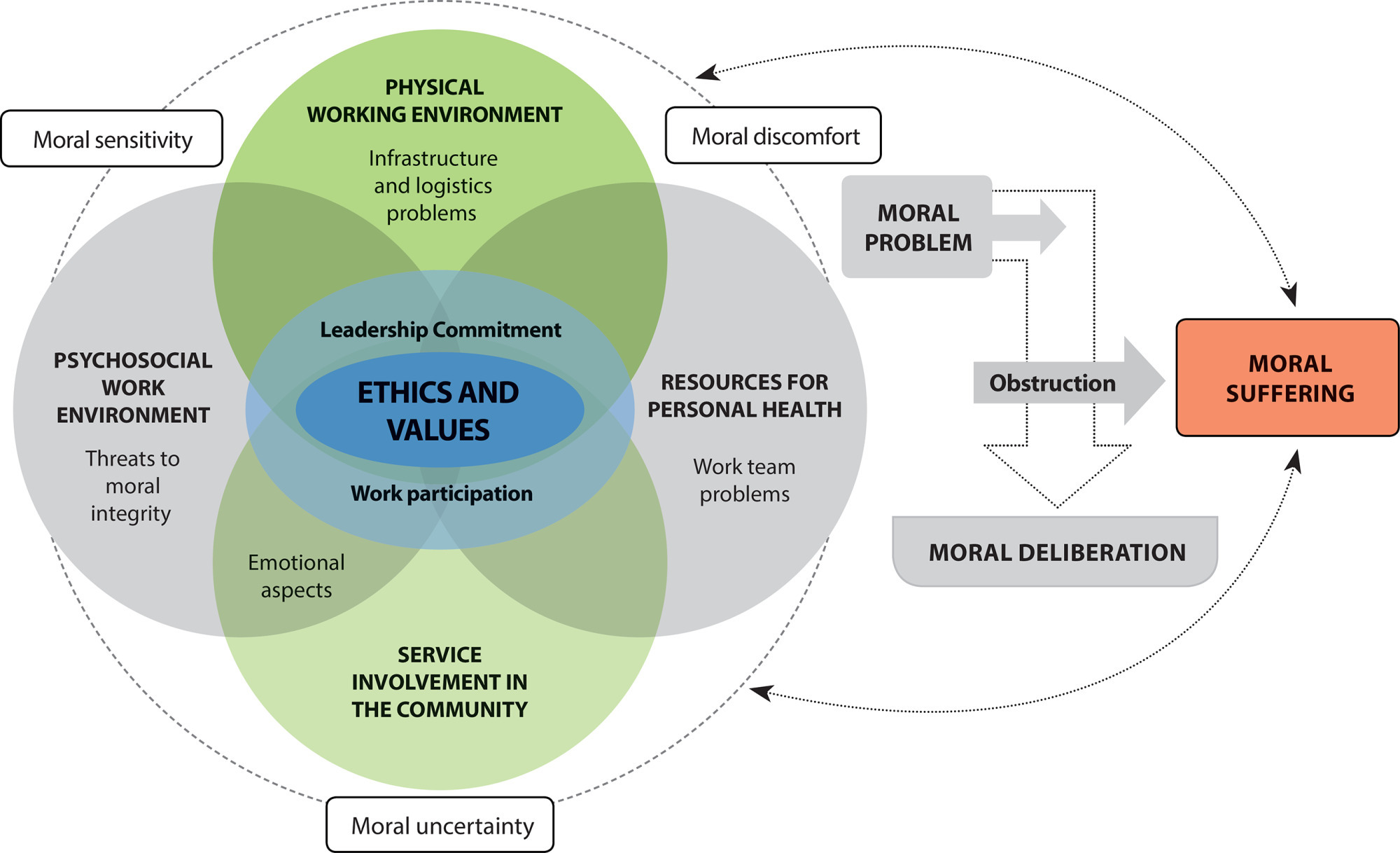-
EDITORIAL
Discoveries of Biological Sciences and their implications for nursing practice
Revista Brasileira de Enfermagem. 2016;69(4):619-620
01-01-2016
Abstract
EDITORIALDiscoveries of Biological Sciences and their implications for nursing practice
Revista Brasileira de Enfermagem. 2016;69(4):619-620
01-01-2016DOI 10.1590/0034-7167.2016690401i
Views0For the longest time, the production of knowledge in the field of biological sciences was viewed as the exclusive responsibility and competence of medical professionals. This scenario has changed in light of the worldwide trend of improvements in other health professions, which includes the need to implement the use of evidence-based methodology in nursing practice. […]See more -
REVIEW
Effects from acupuncture in treating anxiety: integrative review
Revista Brasileira de Enfermagem. 2016;69(3):602-609
01-01-2016
Abstract
REVIEWEffects from acupuncture in treating anxiety: integrative review
Revista Brasileira de Enfermagem. 2016;69(3):602-609
01-01-2016DOI 10.1590/0034-7167.2016690325i
Views0See moreABSTRACT
Objective:
to evaluate the scientific evidence that is available in the literature on the effects of acupuncture for treating anxiety and on the quality of such studies.
Method:
the study is an integrative review of CINAHL, LILACS, PUBMED-PICO, SciELO, and The Cochrane Library between 2001 and 2014. Keywords anxiety, acupuncture therapy, acupuncture, and anxiety disorders were combined among themselves to ensure a wide search of primary studies.
Results:
among 514 articles, 67 were selected to be fully read and 19 were included. Among these, 11 were found to have strong evidence levels. Among the six articles about randomized clinical studies, five were found to be of reasonable quality. Two studies used acupuncturist nurses to perform their interventions. Its results showed positive and statistically significant effects from using acupuncture for treating subjects with anxiety.
Conclusion:
acupuncture seems to be a promising treatment for anxiety; however, there is a need for improving the methodological quality of the research on this field.
-
REVIEW
Palliative care and spirituality: an integrative literature review
Revista Brasileira de Enfermagem. 2016;69(3):591-601
01-01-2016
Abstract
REVIEWPalliative care and spirituality: an integrative literature review
Revista Brasileira de Enfermagem. 2016;69(3):591-601
01-01-2016DOI 10.1590/0034-7167.2016690324i
Views0See moreABSTRACT
Objective:
to analyze scientifi c articles published in international online journals about palliative care and spirituality.
Methods:
an integrative literature review with data collected in September 2014 from the LILACS, SCIELO, MEDLINE/PubMed, and IBECS databases.
Results:
thirty-nine publications were identifi ed and their textual analysis facilitated through four thematic approaches: the meaning of spirituality in the context of palliative care; palliative care and spiritual support; spirituality and relief of pain and other symptoms in patients under palliative care; and instruments to evaluate the spiritual dimension of the scope of palliative care.
Conclusion:
this study examined the relevance of the spiritual dimension in the care of patients with palliative care and the need for developing new studies to disseminate knowledge about this topic.
Descriptors:
Palliative Care; Palliative Care at End of Live; Spirituality; Religion; Health.
-
REVIEW
Educational technologies to encourage (self) care in postpartum women
Revista Brasileira de Enfermagem. 2016;69(3):582-590
01-01-2016
Abstract
REVIEWEducational technologies to encourage (self) care in postpartum women
Revista Brasileira de Enfermagem. 2016;69(3):582-590
01-01-2016DOI 10.1590/0034-7167.2016690323i
Views0See moreABSTRACT
Objective:
to evaluate national and international literature regarding the use of educational technologies to encourage self care in postpartum women.
Method:
an integrative review of the literature. The articles were collected from the CINAHL, SCOPUS, PubMed, SciELO, LILACS and Cochrane databases; the time period for the articles referred to January/2004 to July/2014; the languages used in the articles were Portuguese, English, Spanish and French; the articles were selected from the following descriptors: postpartum care period, educational technology, nursing and self care. Twenty-seven articles were selected for analysis
Results:
based on the information found, the scales, counseling and home visits were among the most recommended educational technologies.
Conclusion:
the technologies promote communication, but are sometimes dependent on computer and internet access, which hinder their use by low-income women.

-
RESEARCH
Patients with HIV/Aids and ulcer risk: nursing care demands
Revista Brasileira de Enfermagem. 2016;69(3):574-581
01-01-2016
Abstract
RESEARCHPatients with HIV/Aids and ulcer risk: nursing care demands
Revista Brasileira de Enfermagem. 2016;69(3):574-581
01-01-2016DOI 10.1590/0034-7167.2016690322i
Views0See moreABSTRACT
Objective:
to analyze the demand for nursing care and the risk of pressure ulcers (PU) of patients with HIV/Aids.
Method:
quantitative survey, carried out from December 2012 to March 2013 in a public hospital of Teresina, state of Piauí, Brazil.
Results:
the sample of 31 patients was predominantly male, mean age 36.6 years, average care demand 49.4%, most showing some risk of developing PU. The variables correlated with PU risk were care demand and clinical outcome (death). Those associated with care demand were age and clinical outcome (death).
Conclusion:
the results showed that patients require moderate nursing care needs and most of them present risk of developing PU.

-
RESEARCH
The experience of grandmothers of children with cancer
Revista Brasileira de Enfermagem. 2016;69(3):559-565
01-01-2016
Abstract
RESEARCHThe experience of grandmothers of children with cancer
Revista Brasileira de Enfermagem. 2016;69(3):559-565
01-01-2016DOI 10.1590/0034-7167.2016690320i
Views0See moreABSTRACT
Objective:
to understand, from grandmothers’ perspectives, the experience of having a grandchild with cancer.
Method:
qualitative study, guided by philosophical hermeneutics. Eight grandmothers of children who had finished an oncology treatment participated in this study. Data were collected through interviews, which were recorded, transcribed, and analyzed according to the principles of hermeneutics.
Results:
the grandmothers underwent an experience of multiplied, silent, transformative, and permanent suffering. They believe it is their role to be present, but they recognize their adult children’s independence and self-determination. Grandmothers highlighted that their experience has been very little accessed and considered by health care professionals.
Conclusion:
we recommend including grandparents in the context of care and in additional research.
-
Psychiatric nursing and mental health teaching in relation to Brazilian curriculum
Revista Brasileira de Enfermagem. 2020;73(2):e20180200
03-09-2020
Abstract
Psychiatric nursing and mental health teaching in relation to Brazilian curriculum
Revista Brasileira de Enfermagem. 2020;73(2):e20180200
03-09-2020DOI 10.1590/0034-7167-2018-0200
Views0See moreABSTRACT
Objectives:
to know the scientific production on psychiatric nursing and mental health teaching in relation to Brazilian nursing curriculum.
Methods:
an Integrative Literature Review with no temporal delineation, whose data collection took place in ten Brazilian and international databases, adding to the total 35 objects of analysis.
Results:
a priori categories were adopted, consisting of the psychiatric nursing and mental health teaching in Brazil according to the 1923, 1949, 1962, 1972, 1994 and 2001 nursing curriculum, presented in the light of the dimensions: thought model; places of practice; methods or contents used; and profile or skills of the student.
Final considerations:
the study made it possible to observe psychiatric nursing and mental health teaching historical evolution, indicating that teaching transformations involved changes in curriculum, Psychiatric Reform and the way nursing undergraduate courses and schools take these determinants.
-
ORIGINAL ARTICLE
Nurse as an integrator in healthcare management of children with chronic condition
Revista Brasileira de Enfermagem. 2020;73(3):e20180453
04-03-2020
Abstract
ORIGINAL ARTICLENurse as an integrator in healthcare management of children with chronic condition
Revista Brasileira de Enfermagem. 2020;73(3):e20180453
04-03-2020DOI 10.1590/0034-7167-2018-0453
Views0See moreABSTRACT
Objectives:
to understand the practice of the nurse in healthcare management of children with chronic condition in the hospital setting.
Methods:
analytical study of qualitative approach with theoretical and methodological reference of institutional ethnography. Developed in the pediatric unit of a university hospital, in a municipality in Northeastern Brazil. Data collections techniques were: participant observation, documentary analysis and semi-structured interview. Participants of the study totaled twenty professionals, including nurses, social workers, psychologists, pharmacists, nutritionists, physiotherapists, and doctors. For data analysis, it was used the Bardin’s Content Analysis with interface of the Atlas.ti software.
Results:
categories of analysis were “Nurse as mediator of healthcare management”; “Nursing process as a mechanism of healthcare management”.
Final
considerations: the nurse proved to be essential for healthcare management of the child with chronic condition, acting as mediator of the relationship between the doctor, the members of the health team, the user and their family.
-
REVIEW
Effectiveness of skin protectors and calendula officinalis for prevention and treatment of radiodermatitis: an integrative review
Revista Brasileira de Enfermagem. 2020;73:e20190815
10-19-2020
Abstract
REVIEWEffectiveness of skin protectors and calendula officinalis for prevention and treatment of radiodermatitis: an integrative review
Revista Brasileira de Enfermagem. 2020;73:e20190815
10-19-2020DOI 10.1590/0034-7167-2019-0815
Views0See moreABSTRACT
Objective:
to analyze the effectiveness of skin protectors and Calendula officinalis for prevention and treatment of radiodermatitis.
Method:
an integrative review conducted at CINAHL, Cochrane Library, Embase, MEDLINE/PubMed, IBECS, LILACS, and Web of Science. The final sample consisted of five studies, four clinical studies and one preclinical. Critical appreciation and narrative synthesis of the findings were carried out.
Results:
the Cavilon™ skin protector was more effective than Sorbolene (cream with 10% glycerin) and less effective than Mometasone Furoate cream. Calendula officinalis was more effective than Trolamine and essential fatty acids and less effective than Ching Wan Hung® for prevention and treatment of radiodermatitis.
Conclusion:
data confirm the potential of Calendula officinalis for prevention and treatment of radiodermatitis and point to promising results regarding skin protector use; however, there is a need for further testing as to the effectiveness of such products.

-
ORIGINAL ARTICLE
Cognition and quality of life relationship among the elderly community: a cross-sectional study
Revista Brasileira de Enfermagem. 2020;73:e20190030
07-08-2020
Abstract
ORIGINAL ARTICLECognition and quality of life relationship among the elderly community: a cross-sectional study
Revista Brasileira de Enfermagem. 2020;73:e20190030
07-08-2020DOI 10.1590/0034-7167-2019-0030
Views0See moreABSTRACT
Objective:
to assess cognitive functions and their association with quality of life among elderly people enrolled in a Family Health Unit (FHU) of Primary Health Care in Recife-PE.
Methods:
a quantitative, descriptive, cross-sectional study in which elderly aged 60 years and over were studied.
Results:
76.7% of the elderly were women and the age group was less than or equal to 70 years. 68.6% had cognitive impairment, and in the quality of life assessment it was found that the social participation facet had the highest mean score among the elderly (14.25), while the lowest was observed in the sensory functioning facet (9.10). There was an association between cognitive decline and quality of life.
Conclusion:
most of the elderly had good quality of life rates, but low cognitive level. Using screening tools allows early detection of health problems, guiding the nursing staff in the construction of preventive measures.

-
ORIGINAL ARTICLE
Expert assessment of the “Neonatal Pain Assessment Program” online course
Revista Brasileira de Enfermagem. 2020;73(4):e20180392
05-18-2020
Abstract
ORIGINAL ARTICLEExpert assessment of the “Neonatal Pain Assessment Program” online course
Revista Brasileira de Enfermagem. 2020;73(4):e20180392
05-18-2020DOI 10.1590/0034-7167-2018-0392
Views0See moreABSTRACT
Objectives:
to assess layout quality, visual identity and content of the “Neonatal Pain Assessment Program” (Programa de Avaliação da Dor Neonatal) online course.
Methods:
a descriptive exploratory study. The course was assessed by 24 experts in pain, neonatology and education. A form containing 20 questions on technical, interface and educational aspects was used. For each item, the score ranged from 0 to 1. Mean scores above 0.7 were considered indicative of high quality of the items. Descriptive statistics were used for data analysis.
Results:
navigation, clarity, ease of localization, content relevance, contextualization, content correction, multiple windows, ease of use, ease of return, ergonomics, esthetics, special brands, audiovisual resources, information and portability were assessed. All aspects obtained a mean ≥ 0.70 and no changes were required.
Conclusions:
the Neonatal Pain Assessment Program is considered as quality educational technology and promising strategy for health education.

-
Are symptoms of depression and anxiety in nursing students associated with their sociodemographic characteristics?
Revista Brasileira de Enfermagem. 2021;74:e20200503
05-28-2021
Abstract
Are symptoms of depression and anxiety in nursing students associated with their sociodemographic characteristics?
Revista Brasileira de Enfermagem. 2021;74:e20200503
05-28-2021DOI 10.1590/0034-7167-2020-0503
Views0See moreABSTRACT
Objective:
to investigate symptoms of depression and anxiety and their association with the sociodemographic characteristics of undergraduate nursing students.
Methods:
a cross-sectional analytical study carried out with students from the Faculty of Nursing at Universidade Federal de Juiz de Fora from June to July 019. Data were collected through a sociodemographic questionnaire and the Beck Depression and Anxiety Inventories.
Results:
192 students participated, with a mean age of 21.44 (±3.56) years. 85.93% of participants were female. The mean depression score was 22.40 (±12.35), and anxiety was 17.56 (±11.98). There was a difference in the mean of the scales for sex and psychotropic drugs (p<0.05). Women presented moderate and severe classification for both scales. Severe symptoms prevailed among students from the 6th to the 10th semester (18.22%).
Conclusion:
there was an association between depression and anxiety symptoms related to gender and psychotropic drugs.
-
Humanization practices in the parturitive course from the perspective of puerperae and nurse-midwives
Revista Brasileira de Enfermagem. 2021;74:e20190743
01-22-2021
Abstract
Humanization practices in the parturitive course from the perspective of puerperae and nurse-midwives
Revista Brasileira de Enfermagem. 2021;74:e20190743
01-22-2021DOI 10.1590/0034-7167-2019-0743
Views0See moreABSTRACT
Objective:
to understand humanization practices in the parturitive course from the point of view of purperae and nurse-midwives.
Methods:
an exploratory, descriptive, qualitative research carried out in a maternity hospital in Bahia State. Semi-structured interviews were carried out, with a structured script applied to 11 mothers and 5 nurse-midwives from March to June 2019. Analysis followed Bardin’s content structure.
Results:
this study unveiled the importance of using soft care technologies, respect for female role, active participation and women’s autonomy as a positive impact on the parturition process.
Final considerations:
nurse-midwives are qualified professionals to assist women in labor and birth. They can favor the implantation and implementation of care with humanization practices, respect for women’s choices and incentive to the normal way of delivery with an expanded view of individual and multidisciplinary needs.
-
Moral suffering in health professionals: portrait of the work environment in times of COVID-19
Revista Brasileira de Enfermagem. 2021;74:e20200653
03-05-2021
Abstract
Moral suffering in health professionals: portrait of the work environment in times of COVID-19
Revista Brasileira de Enfermagem. 2021;74:e20200653
03-05-2021DOI 10.1590/0034-7167-2020-0653
Views0See moreABSTRACT
Objective:
To analyze potential triggers of moral suffering experiences of health professionals, reported in the media, during the COVID-19 pandemic and to propose a theoretical construct of analysis.
Methods:
Study with qualitative approach whose data source were 50 reports published online, collected passively and actively, submitted to Content Analysis with the help of ATLAS.ti software.
Results:
The potential moral problems that trigger moral suffering are related to the threat to moral integrity, infrastructure/logistics and teamwork problems, and emotional aspects, revealing their articulation with damage to the foundations of a healthy work environment, which generated the proposal of a construct.
Final considerations:
The articulation between the experiences of moral suffering and the commitment of the fundamentals of a healthy work environment has brought important contributions to the adoption of strategies to protect and stimulate moral deliberation by professionals in favor of practice and society.

Search
Search in:
Nuvem de Tags
Aged (144) Atenção Primária à Saúde (239) COVID-19 (104) Cuidados de Enfermagem (269) Educação em Enfermagem (151) Educação em Saúde (139) Enfermagem (930) Estudos de Validação (131) Health Education (144) Idoso (208) Mental Health (149) Nursing (987) Nursing Care (306) Patient Safety (151) Primary Health Care (284) Qualidade de Vida (104) Quality of Life (106) Saúde Mental (145) Segurança do Paciente (150) Validation Studies (108)



